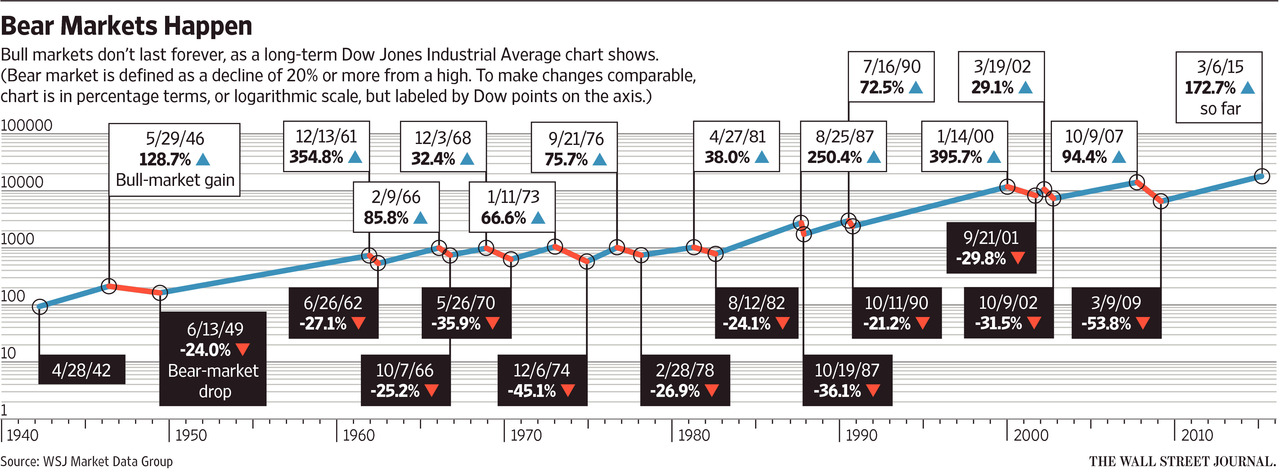
Source: WSJ
Bear Markets Happen
March 18, 2015 1:00pm by Barry Ritholtz
This content, which contains security-related opinions and/or information, is provided for informational purposes only and should not be relied upon in any manner as professional advice, or an endorsement of any practices, products or services. There can be no guarantees or assurances that the views expressed here will be applicable for any particular facts or circumstances, and should not be relied upon in any manner. You should consult your own advisers as to legal, business, tax, and other related matters concerning any investment. The commentary in this “post” (including any related blog, podcasts, videos, and social media) reflects the personal opinions, viewpoints, and analyses of the Ritholtz Wealth Management employees providing such comments, and should not be regarded the views of Ritholtz Wealth Management LLC. or its respective affiliates or as a description of advisory services provided by Ritholtz Wealth Management or performance returns of any Ritholtz Wealth Management Investments client. References to any securities or digital assets, or performance data, are for illustrative purposes only and do not constitute an investment recommendation or offer to provide investment advisory services. Charts and graphs provided within are for informational purposes solely and should not be relied upon when making any investment decision. Past performance is not indicative of future results. The content speaks only as of the date indicated. Any projections, estimates, forecasts, targets, prospects, and/or opinions expressed in these materials are subject to change without notice and may differ or be contrary to opinions expressed by others. The Compound Media, Inc., an affiliate of Ritholtz Wealth Management, receives payment from various entities for advertisements in affiliated podcasts, blogs and emails. Inclusion of such advertisements does not constitute or imply endorsement, sponsorship or recommendation thereof, or any affiliation therewith, by the Content Creator or by Ritholtz Wealth Management or any of its employees. Investments in securities involve the risk of loss. For additional advertisement disclaimers see here: https://www.ritholtzwealth.com/advertising-disclaimers Please see disclosures here: https://ritholtzwealth.com/blog-disclosures/
What's been said:
Discussions found on the web:Previous Post
The Fed’s Hidden Message Contained Within the Dots . . .Next Post
The Global Flow of People

WSJ deserves credit for using a semi-log chart.
What investors really care about is total return. Strangely, Dow Jones has only calculated total returns on the Industrial Average since Sep. 1987. But Global Financial Data backfilled the Dow’s total returns to 1920.
During the 16-1/2 year secular bear market from Jan. 1966 to Jul. 1982, the price-only DJIA lost 1.18% annually (above chart). Including dividends though, it gained 3.39% annually.
Sounds good, until one subtracts 7.03% annual inflation during the period, resulting in a minus 3.64% annual real return for 16-1/2 years. OUCH!
BR – you are clearly not paying attention. Bear markets are passé. Everybody knows that.
Since the low in 10/2002, the S&P is up about 161% (8%/yr.) while the CPI is up about 29% (2%/yr.) and the SSA wage index is up about 35% from 2002 to 2013 (2.7%/yr over 11 periods). From 2004 through 2014, US nominal GDP grew about 45.9% (3.8%/yr. over 10 periods).
There will be corrections, but it seems like a solid case for owning stocks over the long haul, if you are in a position to invest. Technology and the political environment are combining to concentrate the economic spoils. Picketty is right.